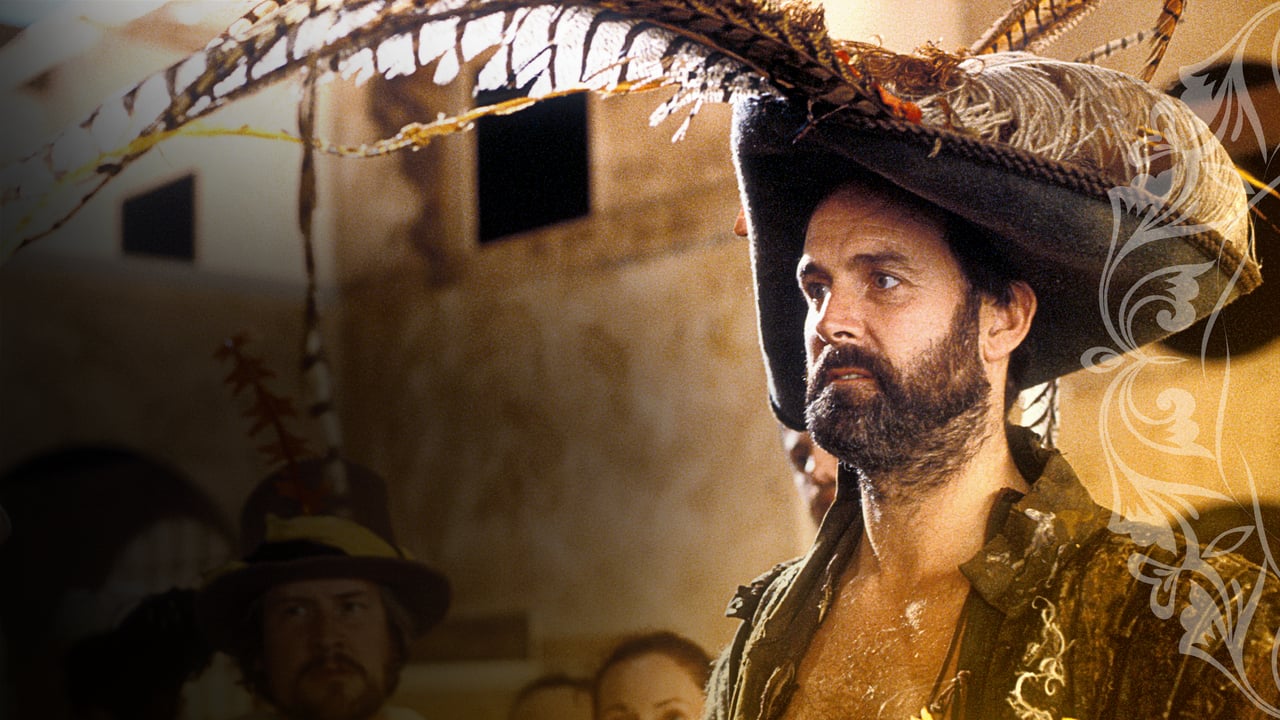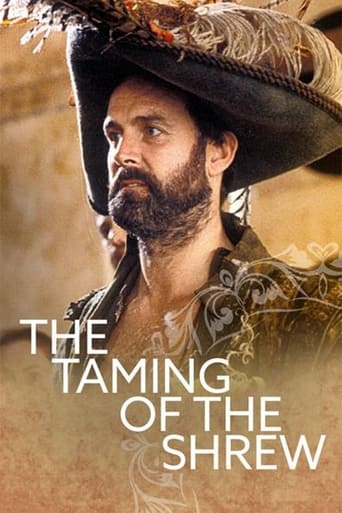



Such a frustrating disappointment
i must have seen a different film!!
Simple and well acted, it has tension enough to knot the stomach.
View MoreIt is both painfully honest and laugh-out-loud funny at the same time.
View MoreEssentially, up until the last hundred or so years, women were property of their husbands and had little or no hope of having control over their own lives. But it does not follow that a woman in such circumstances would be docile by nature. Any woman can make a man happy or miserable depending on how she is managed. This play is a success story about how one man uses psychology to pave his way into a fortune and a prize wife. John Cleese is such an ingenious casting choice for the character of Petruchio in this still-relevant tale of the nature of men and women. Not only for his comedic dryness, but also for his advantage of size in portraying a blustery domineering character. If you admire him in his Python work and are afraid of Shakespeare, simply watch the first 10 minutes of this piece and if you are not captivated, scan forward to Cleese's powerful rendering of Petruchio's soliloquy. He ruins any other actor's chance at improving on his performance. On the other hand, ff you find Shakespeare to contain perennial truths and keen illustrations on the Nature of Mankind, then you will particularly enjoy the perfection of this version. The other actors don't ignorantly recite their lines, but truly convey their meaning through inflection and phrasing. Since Shakespeare often used artful and obscure language even by the standards of his time (this truth is mocked by the "knock me" sequence between Petruchio and Grumio), and gave no notes or stage direction to specifically instruct sarcasm or anger or cluelessness, it is a credit to the company when a Shakespeare play is skillfully revealed to a modern audience, as this one is. Further, the way this play is photographed is so masterfully fluid and economically managed it would not be difficult to fail to notice that the whole of the first 22 minutes is performed on the same 30x50 space.As far as I'm concerned, this rendering of Taming of the Shrew is the gold standard by which all performances will be measured.
View MoreThis is not one of Shakespeare's more popular comedies, because of the inherent misogynism of a story about a cocksure rich man slowly subjugating a childish woman. The first stage show I saw of this play actually reversed this dynamic, with the woman overpowering the man, and the recent Old Vic production saw an all-male ensemble take on the play with successful results.This one is actually very good, despite of the usual BBC budget limitations imposed on it. The acting all round is excellent with the story very well conveyed. The standout has to be John Cleese, who subverts his usual bumptious comic persona to deliver a surprisingly compassionate portrayal of Petruchio. He is well-matched by Sarah Badel's Katherine, whose unbearable stroppiness mellows under his influence.An effective take on a much-maligned stage play.
View MoreIf you want a slapstick, obvious "Shrew," don't waste time, go directly to Zeffirelli's overstuffed, overdecorated jamboree of shtick. OTOH, this production is actually about people, who they are and why they act that way. The cast here may be less star-studded than the other version, but is uniformly funny and very much worth watching.Director Jonathan Miller brings his background as a neurologist into play here to make sure that the characters are not mere eccentric puppets, but are psychologically well-grounded. Sarah Badel gets the palm as Katherina. She doesn't just play the anger and violence of sibling rivalry, she also shows the pain and bewilderment of living in a world where everybody loves her sister more. John Cleese starts off uncertainly, underplaying the verse and slow to abandon Basil Fawlty's tics as he establishes the character of Petruchio, but later he grows in the part and is quite warm and human by the end. In fact, the whole play closes with much greater love and humanity than usual.The rest of the cast is never bad, and occasionally quite brilliant. Anthony Pedley's Tranio is beautifully done, as is John Franklyn Robbins' Baptista, and Frank Thornton's Gremio leaves "Are You Being Served?" completely behind. Jonathan Cecil knows that he has a funny face and tries a little hard, but his Hortensio never breaks context with the rest of the play. Sharp-eyed viewers will recognize Angus Lennie (Mole in "The Great Escape"), Joan Hickson (Miss Marple) and John Bird ("Barnaby Spoot and the Exploding Whoopee Cushion").The beautiful but spare decor is BBC Old Masters. There are some bewildering moments when a Vermeer room is invaded by riotous brawling, but that's probably a good thing. Occasionally a gag misfires, for as Groucho says, "All the jokes can't be good." But the overall impression is very positive. Altogether recommendable.
View MoreJonathan Miller manages to take all the fun out of this play - even the casting of John Cleese as Petruchio was a disaster. When this play was first broadcast on PBS, it was followed by an interview between Miller and Cleese, where they smugly compared their dismal version with that of Franco Zeffirelli, who they thought was much to blame for filling his film with high spirits and humorous images. Don't show the Miller/Cleese version to your children, unless you want to kill dead any interest in Shakespeare they might be developing.
View More